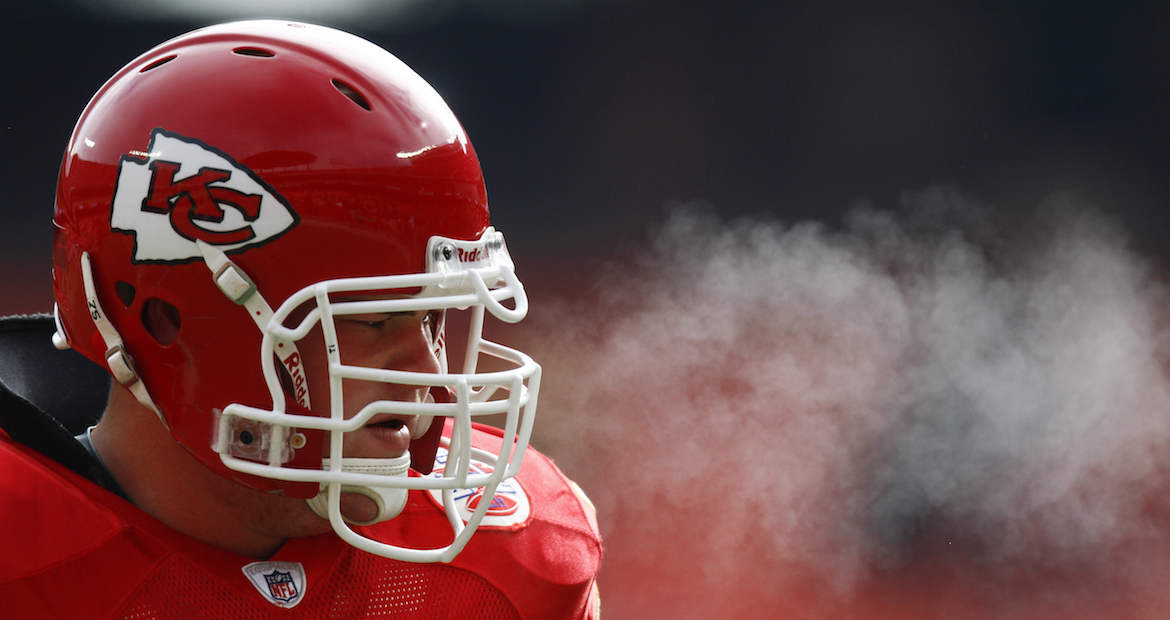
Mental X’s and O’s: Why Athletic Trainers Often Become Powerful Mental Health Allies
“I wanted to win the award for those guys, because they put in a lot of work behind the scenes.” –Jordy Nelson on (briefly) thanking his athletic trainers during his Comeback Player of the Year Award speech, 2017
“We are overworked, but when you’re in it, there’s nothing better.” –David Price, ATC, former athletic trainer for the Kansas City Chiefs, NY Jets, and Philadelphia Eagles.
“Never be afraid to do what’s right. If no one ever says anything, nothing ever changes.” –Chris Kluwe, advocate and former punter for the Seattle Seahawks, Minnesota Vikings, and Oakland Raiders
Anyone who knows me knows that I love anything “behind-the-scenes”. Documentaries about the process of how something comes to be are MY JAM – whether it’s a sporting event (HBO’s Road to the Winter Classic), a museum exhibit (First Monday in May), a backup singer (20 Feet from Stardom), or an NBA Dance Team made up of senior citizens (Gotta Dance!). This is probably part of the reason I chose to be an athletic trainer – it was the perfect combination of medicine, sports, and helping other people achieve their goals. I love the bowels of arenas, the sidelines, the gyms, the travel (ok, maybe not always the travel).
Don’t get me wrong, the life of an athletic trainer is not glamourous by any stretch of the imagination – weeks without a day off, games in the rain and snow, early practices, bodily fluids of every type, and aaaallllllll of the grossest feet you can imagine – but keeping an athlete on the field and helping them finish a game is our entire raison d’être. Athletes may not believe us, but we hate telling them that they can’t play. We hate it, and we want to fix it just as much as they do.
Being there for the athletes is always what drives us, and this can take many forms. Typically it’s keeping them healthy throughout a long and arduous season and overseeing the recovery and rehabilitation programs for those with physical injuries. Sometimes it’s making sure they have extra hair ties, mouth guards, or contact lenses for that one athlete who always loses them. Sometimes it means being a shoulder to cry on. Sometimes, it can even mean saving someone’s life.
I read the incredibly powerful story of Ryan O’Callaghan recently, and his struggles with his sexuality and subsequent addiction to painkillers broke my heart. Several years ago, I attended the Sport, Sexuality, and Culture Conference (held at Ithaca College) where I presented a study conducted by a graduate student of mine for their master’s thesis about the athletic training room as a safe space for LGBTQ+ athletes (Spoiler alert: It’s not always a safe space.).
MORE TFG: THE SILLINESS OF SPORTS SUPERSTITIONS
Over those three days I learned that issues at the intersection of sport and sexuality are pervasive. It could be an athlete struggling to come out, as with O’Callaghan, but it can also be coaches insisting on heteronormative behavior by their athletes, coaches unable to include their same-sex partner in their team’s game-day program bio, athletes facing the stigma of negative stereotypes, or athletes worrying about discrimination from an organization’s administration. I vowed then and there to be a vocal ally and advocate for LGBTQ+ athletes.
(Side note: for in interesting perspective, listen to ESPN’s Kate Fagen’s interview on the Longform Podcast – starting around the 25min mark she discusses being a closeted college athlete.)
Talking with an athlete about a mental health issue is kind of like CPR: you hope you never have to do it, but you need to be prepared for when you do. The stakes can be about the same. Given that many mental health disorders emerge in the late teens and early twenties, the chances of encountering an athlete who might need mental health services are pretty high. There are no published studies on the prevalence of mental health issues in current NFL players; however research indicates that for the most part college and secondary school athletes experience mental health illnesses at the rate of non-athletes (5%-25% depending on the disorder). Scholars Reardon and Factor (Sports Medicine, 2010) and Efandiari, Broshek, and Freeman (Clinics in Sports Medicine, 2011) have good reviews of the extremely limited research that is out there.
When I read that O’Callaghan’s athletic trainer with the Chiefs, David Price, was the first to notice he wasn’t acting like himself and suggest he speak with a therapist, I was hardly surprised. We often develop a strong rapport with our athletes. Research has shown that athletic trainers are only behind parents and coaches when it comes to whom athletes choose to confide in. Studies have repeatedly found that athletic trainers provide significant emotional and social support to athletes, both from the perspective of athletes (Robbins and Rosenfeld, Journal of Sport Behavior, 2001) and healthcare professionals (Tracey, Journal of Sport Rehabilitation, 2008).
The impact Price’s suggestion ultimately had on O’Callaghan stemmed from his dedication to putting the athletes first. “You have to take yourself out of it. When something like this happens, you can’t think about [how much] you want to go home,” Price said via phone last month. “You don’t think about it, you just do it.”
ATs practice emergency procedures every season for things like spine boarding or other catastrophic emergencies so we know where the AED (automated external defibrillator) is at all times, we know the proper order of who gets called when, where the ambulance is parked, how to safely remove a facemask if a player needs an airway, etc.
But many institutions have vague guidelines (if at all) for mental health emergencies. What do you do when you are sitting in your office and an athlete tells you they burn themselves on purpose? How will you react? What will you say? Do you know who to call? The National Athletic Trainers’ Association has published consensus papers on recognition and referral for both collegiate and secondary school athletes with psychological concerns, so if you work at a school with an unclear policy this is a great place to start.
Even approaching the topic of mental health in players can be incredibly challenging, making a strong athlete-AT relationship critical. “Athletes are more perceptive than we give them credit for. They know if you care; and if you care about them, they will trust you,” Price says. “I treated a walk on special teams player the same as the starting quarterback. When they see you take the time, that you put thought into everyone, they notice.”
O’Callaghan noticed.
Price, who spent 34 years in the NFL, immediately made the phone call to the Chiefs’ mental health counselor in a moment that ultimately saved O’Callaghan from killing himself. An athlete disclosing suicidal ideation is an extreme example (though one that has happened to me as well), but some situations are less obvious. “You have to listen to your athletes. You have to train yourself to always think about what is the worst that could happen. Then you can be prepared,” he continued. “I could sense the importance of what he was trying to say…you have to recognize the emergency in front of you.”
MORE TFG: LEARNING TO LOVE THE NFL AGAIN
Athletic training education includes competencies on how to refer athletes to mental health counseling. I have given many lectures on this topic, and it can be a difficult conversation to initiate. I have my students role play the conversation; I give them pointers and we discuss examples of how they might phrase things. My philosophy has always been that mental health *is* physical health, so there is no reason to treat one as more scary than the other. Your brain is an organ like, say, your pancreas. When your pancreas doesn’t work, you get treated for your diabetes; when your brain doesn’t work, you get treated for your depression.
I agree with Aaron Rogers who recently spoke in an ESPN interview about O’Callaghan (who blocked for him at Cal), that football is moving towards acceptance of LGBTQ players. I’m not sure if it will take an already established and successful (i.e., not at risk of getting dropped for “performance” issues) current player coming out, or simply more and more open college players entering the draft (there are now six openly gay college football players in various divisions) for the NFL to move at anything more than a glacial pace towards inclusion.
To be fair though, efforts towards change in the league have been picking up steam in recent years. Outsports.com listed “50 LGBT-inclusive things the NFL, its teams and players have done” . And they took a big step recently in announcing their new employee initiative, NFL Pride, which will “serve LGBTQ employees and their allies as they support a culture on inclusion” according to a league memo. O’Callaghan was invited to be a panelist for its official launch. Of course, I would also be remiss to not mention the first openly gay coach in male professional sports, Katie Sowers of the San Francisco 49ers. As she so eloquently said, “The more we can create an environment that welcomes all types of people, no matter their race, gender, sexual orientation, religion, the more we can help ease the pain and burden that many carry every day.”
All of these efforts are great, but until football is truly understood to be welcoming for all, closeted and/or struggling athletes are going to need our support. As O’Callaghan’s story underscores, sports medicine staff can be a critical piece in linking the mental and physical. “There is an under-appreciation for athletic trainers until something bad happens,” Price says. “[Ryan’s story] has added validity to what I’ve done, and to what we do as athletic trainers.”
Resources:
NFL Lifeline (for current and former NFL players)
800-506-0078
Suicide Prevention Lifeline
800-273-8255
LGBT National Help Center
888-843-4564
You Can Play Project
http://www.youcanplayproject.org/
Athlete Ally
If you are an athletic trainer and have questions about mental health (or mental skills) and athletes please email me at lwashington@thefootballgirl.com



